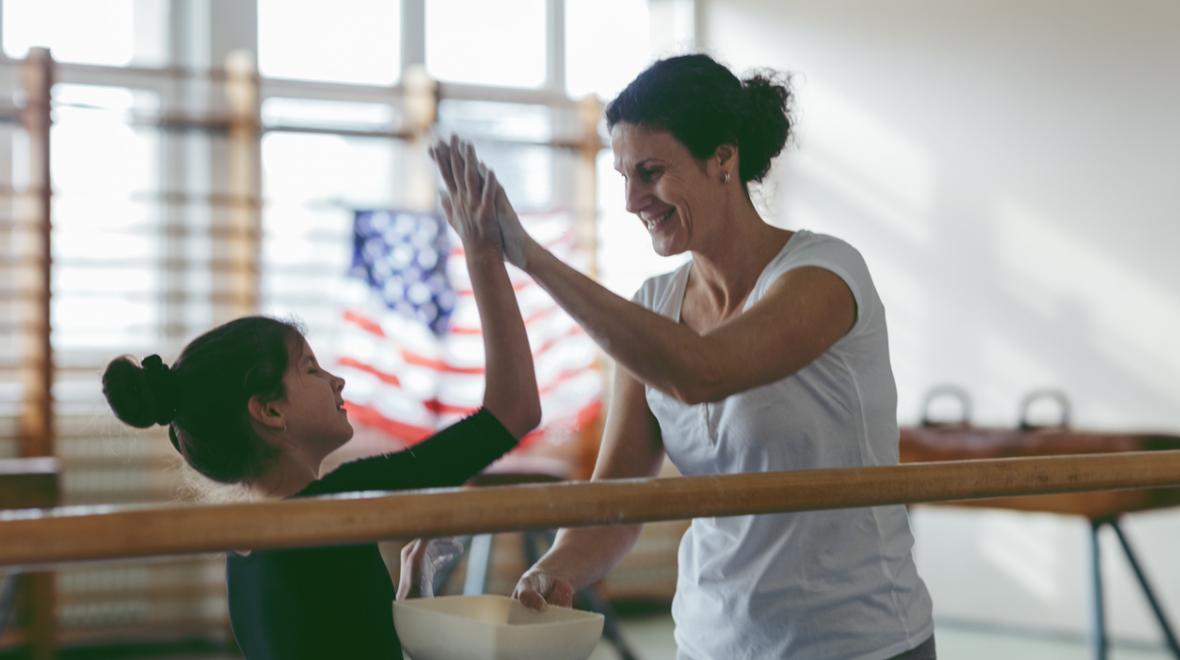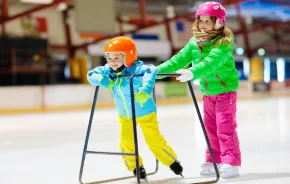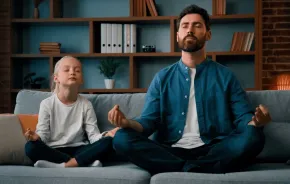
With both Naomi Osaka and Simone Biles stepping back from competition on the international stage to take care of their mental health in recent months, the spotlight has come to focus on the extreme stress and pressures of professional athletics. Closer to home, parents may be asking what they should do to protect their own kids’ mental health when they are participating in youth sports.
ParentMap spoke with Jilyne Jarvis, co-founder and executive director of ZGiRLS, a Seattle-area nonprofit founded by female Olympic and NCAA athletes, about how parents can support their kids in dealing with the pressures of youth athletics.
What motivated you to start ZGiRLS?
At ZGiRLS, we empower girls to recognize their thoughts and to know their minds. Athletes — and children in general — aren’t necessarily taught mental skills. Especially in sports, we are taught physical skills, but we are not taught the same thing with our mind — whether it’s building confidence, building resilience or learning how to deal with adversity. So often we are told you’re either born with it or you’re not. That was our motivation for starting ZGiRLS. These are skills you can learn.
I hope that we can get to a point where we start teaching kids so much earlier what mental awareness is and how to navigate what’s going on in their own minds so that they’re at least aware of what their baseline normal is. They can parse stress. Is this stress because I’m excited? Or is this stress because I haven’t had enough sleep or enough to eat? Am I overwhelmed? Then they can pick apart what they feel on their own and communicate that to their support person.
Often when kids are young, they go to two or three practices and then want to quit. Or one day they want to quit and the next day they don’t. When should a parent let a kid quit their sport?
That is a tough question, as it all depends on circumstances. At ZGiRLS, we teach resilience and commitment — not only to the team, but a commitment to yourself. We do want to teach children to overcome and persevere, even when it’s uncomfortable. Even when it’s tough. That’s when growth happens: When things get challenging, then you push through.
But that said, recognizing when something is dangerous or not in their best interest, then [it is time to] definitely quit. It comes down to the child being able to recognize that in themselves. It’s a fine line between supporting our children to what we know they’re capable of, but it has to be driven by the child. It comes down to equipping them with the tools when they are younger to empower them to use their voice and mind. At ZGiRLS, when we teach resilience, we talk about checking in with the values they have identified that are important to them.
Do I want to quit because I’m missing out on a dance? Or because I failed? Or because I’m embarrassed? It’s about helping children to figure out their minds, just like they’re figuring out their bodies. Of course, in teens, you have hormones and all the other things that go along with adolescence. But it’s about empowering children to use their voices and understand their minds.
Simone Biles, in her situation, thankfully knows her own mind! She was able to say, “No, this is serious. I’m going to step away even though the whole world is watching.” She knew that her own safety was more important than the world saying, “We don’t understand, explain this to us.” Maybe an athlete who wasn’t as aware as she was would’ve [competed] and gotten very severely injured. But she is someone who is very aware of her body and her mind.
How can parents help alleviate the stress on their child caused by youth sports participation?
It’s so important for parents to not tie self-worth to outcomes. To really emphasize effort and the process rather than the outcome — the goal, the score, the place. Really emphasize the growth in the process, so the child doesn’t feel all that outcome-oriented pressure. If you don’t do well in a performance, it doesn’t make you a failure — that just wasn’t a good day. Your self-worth is a process, and it’s always improving. Everybody has the ability to grow and improve at all times. So, saying, for instance, “How can we grow through this? What can we learn and how can we enjoy this process without worrying about the outcome?”
Often, we aren’t aware as parents that our ego is lived out through our kids. Check in and ask yourself: “Is this what I want? Or is this what my child wants?” Let your child take the driver’s seat, and you take the back seat; let them be the driver of their goals and dreams. When they’re driven by the parents, the athlete may go far, but it often leads to resentment.
Remember that you are the support person. And it’s also about communication: You have to keep checking in with your child.
Also, for kids, it’s super helpful for them to have a mentor in their sport. It could be their coach, a teacher, a counselor or other trusted adult. Oftentimes, kids don’t go to their parents first.
How can parents know when to intervene if they feel a coach is being too harsh?
I’ve been a coach, and I’m always a fan of athletes advocating for themselves. So, the parents can ask their athlete what is going on with the coach and then ask the child, “What do you need to be supported?”
And then empower your child to bring this up with their coach. Of course, if the coach shuts down, then the parent needs to intervene. But the first conversation should be from the athlete. It’s all a part of empowering the child to trust themselves.
Trust that they know their body, their mind and that they know themselves best. Of course, if the coach doesn’t listen to your child, then you need to jump in to protect your child.
How do you know when to seek professional help for your child for a mental health issue?
If your gut is telling you something is wrong, seek help.
If you hurt your ankle, it might be sprained or broken. So, you go to the doctor and get an X-ray, you get an answer. It’s the same with our minds. For example, if you think your daughter is depressed or seems to have a lot of anxiety, and you are wondering if it is normal, ask a professional and then navigate from there. Your pediatrician can be the first line of defense. Because you don’t want to miss something and, in retrospect, wish you had asked for help sooner. Your mind can be injured, too, and it can heal. So get it looked at.
About ZGiRLS
ZGiRLS supports the mental development of girls ages 11–16. Designed by sports psychologists, professional athletes, curriculum developers and mental health counselors, the ZGiRLS curriculum is results-driven and gives girls the tools they need to be confident, centered and courageous. To learn more about the ZGiRLS curriculum and programs, view the parent videos on the ZGiRLS website.
ZGiRLS offers many free resources, including a free download of its five-step “Go Far” method to building confidence.











